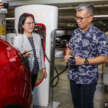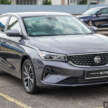Malaysia’s target is to have EVs and hybrids account for 20% of new car sales by 2030, 50% by 2040 and 80% by 2050. The figures were laid out by minister of investment, trade and industry Tengku Datuk Seri Zafrul Abdul Aziz.
He said that Malaysia has a competitive edge to attract more high-value investments, having developed a comprehensive ecosystem for EV and Next Generation Vehicles (NxGV, the term the government uses for electrified vehicles) industries.
“In getting the fundamentals right on our NxGV ecosystem, we are diligently building the necessary infrastructure to achieve our target of having EVs and hybrids account for 20% of new car sales by 2030; 50% by 2040 and 80% by 2050,” he said at the launch of the E-Mobility Asia 2023 event this week, reported by Bernama.
Zafrul said the government has a strong policy push, and over the past 50 years, Malaysia has developed a strong electrical and electronics (E&E) industry, mainly in semiconductors, which recent Covid-induced shortage greatly affected the automotive industry.
The senator revealed that Malaysia accounts for 7% of global semiconductor trade and 13% of global chip testing and packaging, which is a substantial share given our country’s size. Therefore, MITI and its agency MIDA (Malaysian Investment Development Authority) are strongly pushing for more semiconductor investments.
Our strength in E&E means Malaysia is well placed to capture a “good slice” of the ASEAN electric vehicle (EV) market, which is estimated to reach US$2.7 billion by 2027 from US$500 million in 2021.
“Malaysia has become a highly attractive destination in the region for all EV investors because of these established existing ecosystem advantages that are highly conducive for the development of EVs and its related components. These are compelling factors for big names such as Tesla to announce its entry into the country, joining global automakers like Geely, Chery and BYD from China, Hyundai from South Korea, as well as Mercedes Benz and BMW from Europe, that are already in the Malaysian market,” Zafrul said.
“We look forward to welcoming more multinational EV, NxGV and renewable energy (RE) investors to Malaysia to become our growth partners in developing a strong Malaysian EV supply chain to meet the needs of the regional and global market.
“Towards that end, we also hope to collaborate with our neighbours in ASEAN — whether they are from Thailand, Vietnam, Singapore, the Philippines or Indonesia — to complement each other’s strengths so we can capitalise on supply chains that have shifted directly on our doorstep,” he added.
The post Malaysia targets EVs and hybrids to make up 50% of new car sales by 2040, 80% by 2050 – Tengku Zafrul appeared first on Paul Tan’s Automotive News.




